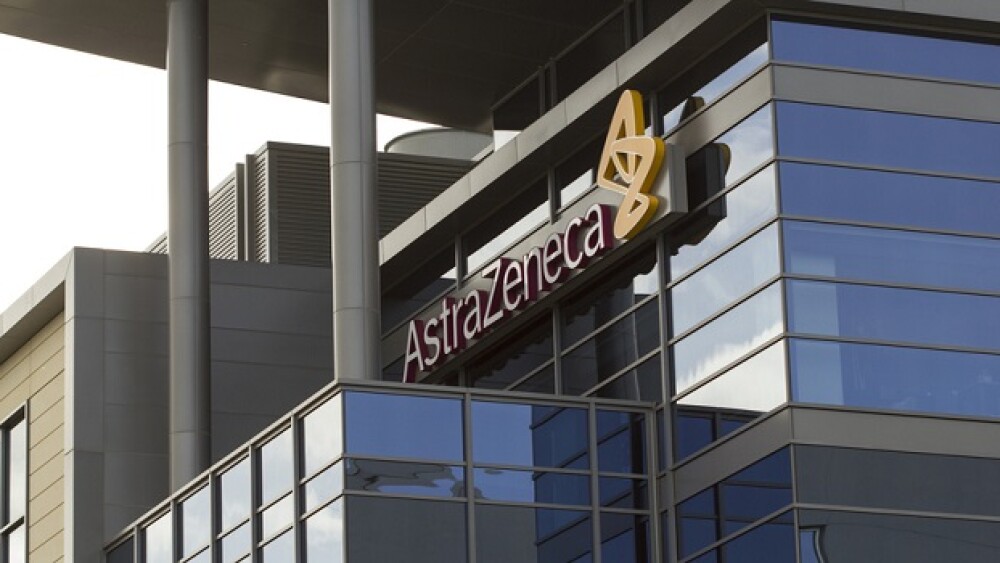Topline results for its Daiichi Sankyo-partnered antibody-drug conjugate showed statistically significant improvement. However, AstraZeneca shares dropped around 6% in early Monday trading.
Pictured: AstraZeneca’s San Francisco office/iStock, hapabapa
AstraZeneca shared topline results Monday from a Phase III lung cancer trial of its Daiichi Sankyo-partnered antibody-drug conjugate. However, investors were apparently unimpressed by the limited data, sending AstraZeneca’s shares dropping around 6% in early trading.
The pharma partners touted “statistically significant improvement” for progression-free survival for non-small cell lung cancer patients treated with datopotamab deruxtecan (Dato-DXd), but forgoing details for now. The TROP2-directed ADC was pitted against docetaxel, the standard of care chemotherapy, in patients with locally advanced or metastatic NSCLC with at least one prior line of therapy.
What seemed to temper investor entusiasm was the lack of data for the other dual primary endpoint—overall survival. According to the release, OS data “were not mature” yet but an “early trend was observed” for Dato-DXd that did not meet statistical significance.
Concerns also emerged over safety as some grade 5 events—death—occurred in the trial.
Investors were apparently looking for stronger language from AstraZeneca conveying the benefits of the drug. Jefferies analysts, cited by Bloomberg, said the description of the data by the company suggests the benefit is less pronounced than hoped for.
Still, it’s too early to make a call yet with limited data, as the NSCLC market remains ripe for more effective treatments.
Chemotherapy is the first treatment of choice, killing the body’s good cells along with the bad and causing a slew of side effects and health issues for patients. ADCs, which utilize an antibody to target a protein expressed on the cancer cells to deliver the coupled chemo directly, have the potential to spare the healthy cells.
AstraZeneca already has an ADC on the market. Enhehrtu, its HER-2 directed ADC, was developed with Daiichi Sankyo and approved in 2019 for breast cancer.
On the heels of that success, the two inked a deal worth up to $6 billion for Dato-DXd in 2020. NSCLC is the first indication in line for potential approval, with studies underway in breast cancer as well.
Gilead’s Trodelvy (sacituzumab govitecan) was the first TROP-2 directed ADC approved in 2020. It’s on the market for types of breast and urothelial cancers. Trodelvy is also being studied in lung cancer, head and neck cancer, as well as endometrial cancer. With recent indication expansions, the ADC is on track to become a blockbuster drug for Gilead.
While Trodelvy is first-in-class, AstraZeneca appears hopeful to be the first TROP2 ADC approved for NSCLC. The release stated the company plans to share data with the regulatory authorities.
“These first Phase III trial results from the datopotamab deruxtecan clinical program provide compelling evidence for the potential role this TROP2 directed antibody-drug conjugate can play in treating patients with lung cancer,” Susan Galbraith, AstraZeneca’s executive vice president for oncology R&D, said in a statement.
Merck also has an anti-TROP2 ADC in the running for both NSCLC and breast cancer in Phase II and Phase III trials, respectively. In a Phase II NSCLC study, the ADC shrank tumors in 44% of the 39 participants, touting “encouraging” anti-tumor activity. Merck exercised an option with Kelun-Biotech—a holding subsidiary of Sichuan Kelun Pharmaceutical—for rights to SKB264, excluding the Greater China region, in 2022.
Kate Goodwin is a freelance life science writer based in Des Moines, Iowa. She can be reached at kate.goodwin@biospace.com and on LinkedIn.






